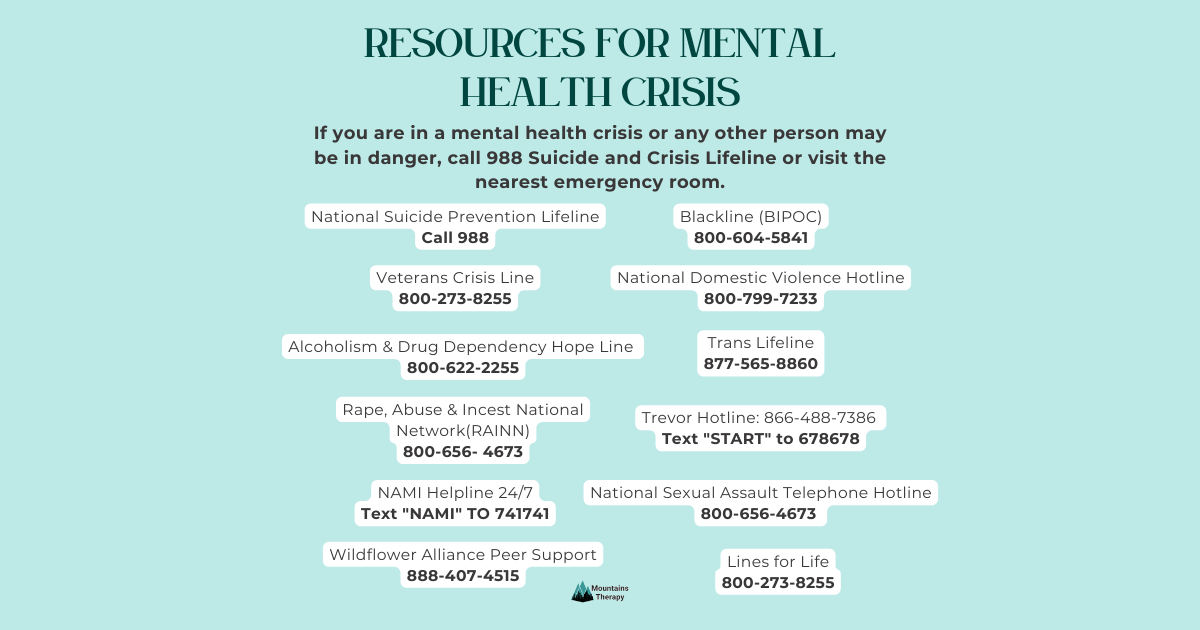What to Do During a Mental Health Crisis: Resources

When life feels overwhelming and you're in the middle of a mental health crisis, it can be difficult to know where to turn. At Mountains Therapy, we want you to know that you’re not alone, and there are caring people and resources ready to support you.
Whether you're facing a crisis yourself or seeking guidance for a loved one, here’s a helpful list of hotlines and helplines that can provide immediate, compassionate help when it's needed most. We encourage you to keep these resources on hand—because sometimes, knowing who to call can be a lifeline.
General Mental Health and Suicide Prevention
If you’re struggling with intense emotions, feeling overwhelmed, or experiencing suicidal thoughts, there are people who want to help you get through it:
1. National Suicide Prevention Lifeline: Call 988
This lifeline is available 24/7, providing crisis intervention and emotional support to anyone in need.
2. Lines for Life: 800-273-8255
Known for its dedication to preventing substance abuse and suicide, this helpline offers support and guidance for a wide range of mental health challenges.
3. Veterans Crisis Line: 800-273-8255
For veterans who may be struggling with mental health challenges after service, this line connects callers with support that understands their unique needs.
4. NAMI Helpline: Text “NAMI” to 741741
Available 24/7, the National Alliance on Mental Illness offers a text line for those facing a mental health emergency or seeking mental health support.
LGBTQIA2S+ Support
For members of the LGBTQIA2S+ Community, crisis lines like these offer safe, understanding, and non-judgmental support:
1. Trans Lifeline: 877-565-8860
This peer-support hotline is staffed by trans individuals who provide support specifically for other trans people facing crisis or in need of someone who understands.
2. Trevor Hotline: Call 866-488-7386 or Text “START” to 678678
The Trevor Project’s lifeline is specifically for LGBTQIA2S+ youth, offering a supportive, safe space for those needing help with mental health challenges.
Support for BIPOC Communities
BIPOC communities can face unique mental health challenges, and support is available to address these specific needs:
1. Blackline: 800-604-5841
A peer-support line dedicated to Black, Indigenous, and people of color, this line is a safe space for those facing crisis or experiencing trauma related to identity and social issues.
Domestic Violence & Intimate Partner Violence
If you or someone you know is experiencing violence, these hotlines provide caring support and resources:
- National Domestic Violence Hotline:
800-799-7233
A 24/7 hotline providing safety planning and support for those experiencing intimate partner violence, offering compassionate assistance for taking the next steps.
Sexual Assault Resources
1. RAINN - Rape, Abuse & Incest National Network: 800-656-4673
The largest organization against sexual violence in the U.S., RAINN offers support to survivors and can connect callers to resources in their area.
2. National Sexual Assault Telephone Hotline: 800-656-4673
This hotline connects individuals directly with trained counselors at sexual assault service providers nearby.
Substance Use and Addiction Support
If substance use is causing distress, or if you're seeking recovery support, this resource is here to help:
1. Alcoholism & Drug Dependency Hope Line: 800-622-2255
A 24/7 hotline for those struggling with substance abuse, this helpline offers guidance, support, and connection to recovery resources.
Peer Support for Emotional Wellbeing
Sometimes, connecting with others who’ve been through similar experiences can provide comfort and understanding:
1. Wildflower Alliance Peer Support: 888-407-4515
This peer-run support line offers understanding and empowerment for those dealing with mental health challenges, from people who truly understand.
Understanding a Mental Health Crisis: What It Is and What It Isn’t
A mental health crisis is a situation in which an individual’s behavior, thoughts, or emotional state puts them or others at serious risk. This can include experiencing overwhelming anxiety, intense emotional distress, self-harm urges, suicidal thoughts, or harmful behaviors due to substance use. A crisis often feels like an emotional breaking point—where everyday coping skills are no longer effective, and immediate support is necessary to ensure safety and stability.
However, it’s also important to recognize what isn’t considered a crisis. Feeling sad, anxious, or stressed due to common life events, like a difficult work week or a relationship issue, doesn’t necessarily constitute a crisis. While these feelings are valid and may benefit from professional support or coping strategies, a mental health crisis typically requires urgent, focused intervention due to its immediate risk. Knowing the difference helps you or your loved ones understand when to reach out to these specialized resources versus when to seek general support or therapy.
Life is full of challenges, and when those challenges feel overwhelming, reaching out can make all the difference. Remember, you’re not alone on this journey. Mountains Therapy is here to support you in finding peace, resilience, and strength, no matter the circumstance. If you or someone you love is going through a mental health crisis, use these resources.
If you or someone you love is not going through a mental health crisis, please reach out to us to individual therapy. Together, we can work toward healing, connection, and hope.










